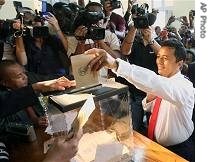2006年VOA标准英语-Madagascar Holds Largely Peaceful Presidential(在线收听)
By Scott Bobb
Johannesburg
03 December 2006
In Madagascar Sunday, voters were choosing a president in what observers say was a mostly peaceful process. Many analysts say President Marc Ravalomanana is expected to win re-election, although a run-off election is possible, if he fails to win at least 50 percent of the vote. VOA Correspondent Scott Bobb reports from our Southern Africa bureau in Johannesburg.

Madagascar President Marc Ravalomanana casts his ballot in Antananarivo, 3 Dec 2006
Voter turnout was light early Sunday, but increased in the afternoon, as many of Madagascar's six million registered voters cast ballots for their next president.
The head of the National Democratic Institute monitoring group, Kelley Jones, said the government had made considerable efforts to ensure a free and fair vote.
"The administration has taken a lot of new measures to ensure the credibility of this election, and ensure the appropriate preparedness for the election," said Jones.
She said, nevertheless, election officials faced major challenges, due to a lack of communications and poor roads in some parts of the country. Results are expected in several weeks.
Election workers said ballots for several opposition candidates failed to reach some voting stations. Under Madagascar's law, candidates were required to print and deliver their own ballots.
President Marc Ravalomanana is seeking a second five-year term against 13 contenders. The wealthy businessman, who began his career as a milk vendor, staged a well-organized campaign, based on his economic record.
However, his opponents countered that he had failed to make significant progress toward easing poverty in a country where three-fourths of the population lives on less than $1 per day.
During the campaign, some opposition candidates complained of a lack of transparency in voter registration lists, and several opposition groups boycotted the election, saying it was held two months early, which violated the constitution.
In addition, last month, a retired general called the vote unconstitutional, and called for an interim military government to take power. Authorities are searching for him and several officers.
The government also refused to allow an exiled opposition leader, Pierre Rajaonarivelo, to return home to compete in the polling, saying he was wanted for fraud and would be arrested.
The presidential election five years ago resulted in a seven-month-long crisis that was marked by sporadic violence.
Mr. Ravalomanana and then-President Didier Ratsiraka both claimed victory. The standoff ended when Ratsiraka went into exile in France.